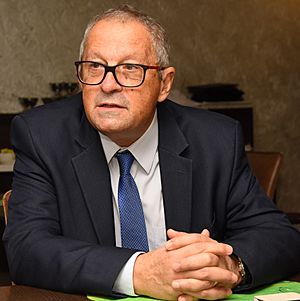Joseph Sifakis facts for kids
Quick facts for kids
Joseph Sifakis
|
|
|---|---|
 |
|
| Born | 26 December 1946 (age 79) |
| Citizenship | Greek-French |
| Education | National Technical University of Athens (BS) University of Grenoble (MS, PhD) |
| Known for | Model checking |
| Awards | National Technical University of Athens University of Grenoble |
| Scientific career | |
| Fields | Computer science |
| Institutions | CNRS, École Polytechnique Fédérale de Lausanne |
| Notable students | Stavros Tripakis |
Joseph Sifakis is a famous computer scientist from Greece and France. He won a very important award called the Turing Award in 2007. He shared this award with Edmund M. Clarke and E. Allen Emerson. They were recognized for their work on something called model checking, which helps make sure computer systems work correctly.
Contents
About Joseph Sifakis
Early Life and Education
Joseph Sifakis was born in Heraklion, a city on the island of Crete in Greece, in 1946. He now lives in France. He went to the National Technical University of Athens to study Electrical Engineering. Later, he studied Computer Science at the University of Grenoble in France. He was able to study there thanks to a French scholarship, which is like financial help for students. He earned his first doctorate degree in engineering in 1974 and another state doctorate in 1979, both from the University of Grenoble. A doctorate is a very high university degree.
Career and Research
Joseph Sifakis is currently a Research Director Emeritus at the Centre national de la recherche scientifique (CNRS). This means he is a highly respected researcher who has retired but still contributes to science. He works at the VERIMAG laboratory near Grenoble, which he also founded.
Sifakis has been a leader in two important areas of computer science:
- Model Checking: This is a way to check if computer systems work exactly as they are supposed to.
- Embedded Systems: These are computer systems built into other devices, like the computers in your phone, car, or washing machine.
He helped start a major conference called CAV with Edmund M. Clarke and Amir Pnueli. The first CAV conference was held in Grenoble in 1989. He also led a European project called ARTIST from 2004 to 2012. This project focused on research into embedded systems.
From 2008 to 2011, Sifakis held a special position at INRIA-Schneider, which involved working with industry. He was also a full professor and the Director of the "Rigorous System Design Laboratory" at EPFL in Switzerland from 2011 to 2016. He has also been a visiting professor at universities in China, including Tsinghua University and SUSTech.
From 2014 to 2016, Sifakis was the President of the Greek National Council for Research and Technology. This role involved guiding research and technology efforts in Greece.
Joseph Sifakis's Work
System Verification and Formal Methods
Joseph Sifakis focused his work on making sure computer systems are correct and reliable. He used "formal methods," which are like very strict mathematical rules, to design systems. In his early work, he studied the ideas behind model checking, which is an algorithmic way to check systems. In 1982, this technique was used to create a tool called CESAR, which helped verify computer systems.
VERIMAG Laboratory and Tools
Sifakis led the VERIMAG laboratory for 14 years. This lab worked with companies like Airbus and Schneider Electric. They developed ways and tools to create "safety-critical systems." These are systems where a mistake could be very dangerous, like in airplanes or power plants. One important tool they helped develop is the SCADE synchronous programming environment. This tool helps programmers write code that works perfectly in time-sensitive systems.
Sifakis also worked on checking systems that involve time and different types of signals, alongside researchers like Thomas Henzinger and Amir Pnueli. He helped develop several important verification tools, including the IF toolset, Kronos, CADP, and TGV. He also created theories to handle the "state explosion problem." This problem happens when a system has too many possible states, making it hard to check them all. His work helped simplify this process using "abstraction techniques."
Modern System Design
In recent years, Joseph Sifakis has focused on designing systems using a "component-based" approach. This means building systems from smaller, reusable parts, like building with LEGO bricks. He used something called the BIP component framework for this. More recently, his work has been on designing "trustworthy autonomous systems." These are systems that can make decisions on their own and can be relied upon, such as self-driving cars.
Awards and Honors
Joseph Sifakis has received many important awards and honors for his contributions to computer science:
- Turing Award, 2007
- Leonardo da Vinci Medal, 2012
- Grand Officer of the National Order of Merit, France, 2008
- Commander of the Legion of Honor, France, 2011
- Member of the French Academy of Sciences, 2010
- Member of Academia Europaea, 2008
- Member of the French Academy of Engineering, 2008
- Member of the American Academy of Arts and Sciences, 2015
- Member of the National Academy of Engineering, 2017
- Foreign member of the Chinese Academy of Sciences, 2019
See also
 In Spanish: Joseph Sifakis para niños
In Spanish: Joseph Sifakis para niños
 | Aurelia Browder |
 | Nannie Helen Burroughs |
 | Michelle Alexander |

